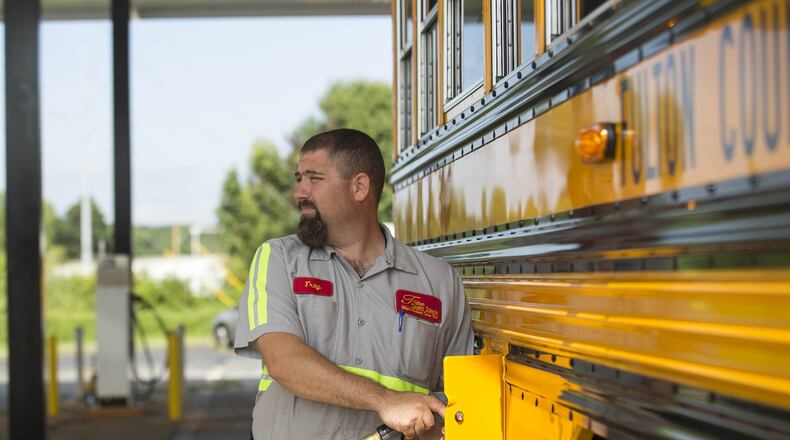Metro Atlanta school districts say they’ve been able to absorb soaring fuel costs and get students to class each day — but the future is less certain.
Fuel prices have spiked in recent weeks after Russia invaded Ukraine and the U.S. banned Russian oil.
It’s a change felt acutely by the school districts that use thousands of diesel-powered buses to transport students each day. The average price of diesel in the Atlanta area has gone up by more than $1 a gallon, from $3.89 a month ago to $5.05 as of Tuesday, AAA reported.
“We want to make sure that as we finish these last two-and-a-half months of school that there’s no disruption to the education process,” Richard Woods, the state school superintendent, told The Atlanta Journal-Constitution. “We want to make sure that we have our kids face-to-face each day.”
The Georgia Legislature recently suspended the state’s gas tax through May 31. In addition, the U.S. Department of Education said school districts can use federal funds to help cover the rising cost of gas.
“The state interventions are expected to help, but we’re not sure yet if it is enough to offset the increases,” said Fulton County School District spokesman Brian Noyes via email.
The district in recent years has invested in buses that use alternative fuel sources. Of its 930 total buses, more than half are powered by propane, unleaded gas or electricity.
Although Fulton has stayed within its $4 million fuel budget this year, that budget is expected to increase next year, Noyes said.
The Cobb County School District is also predicting a direct impact to its budget, its chief operations officer Marc Smith said in an emailed statement.
Cobb uses 39,000 gallons of diesel and 6,500 gallons of unleaded gas per week to transport 72,000 students. The increasing gas prices make it difficult to prepare an accurate budget for next year, according to a district spokeswoman.
The Gwinnett County School District, the largest in the state, uses 1,900 diesel-fueled buses to transport students. It’s also stayed within its $8.9 million fuel budget for the year so far, said spokeswoman Sloan Roach via email.
“GCPS has no plans to change operations at this point,” she said. “The impact rising gas prices might have on future budgets will be determined as we assess the ongoing situation.”
The Clayton County School District has similarly stayed within its $2.5 million fuel budget this year, said spokesman Charles White via email. The district uses 460 buses and 242 other vehicles. The pandemic helped it stay under-budget, White said, as students are attending fewer field trips and extra activities.
Atlanta Public Schools and the DeKalb County School District both reported no disruptions to their transportation services. Both districts rely mostly on diesel fuel.
Although metro Atlanta districts have largely been able to cover the unexpected costs so far, rural or smaller districts might struggle, Woods said. He’s seen that the rising gas prices — coupled with the existing, pandemic-driven shortage of bus drivers — have led some districts to adjust their bus schedules by consolidating pickup or drop-off points, for example.
Woods said that schools must be proactive to prepare for continued cost inflation.
“At the end of the day, we’re going to be required to get kids from their home to our schools,” he said. “We have to be thinking about the future.”
About the Author





